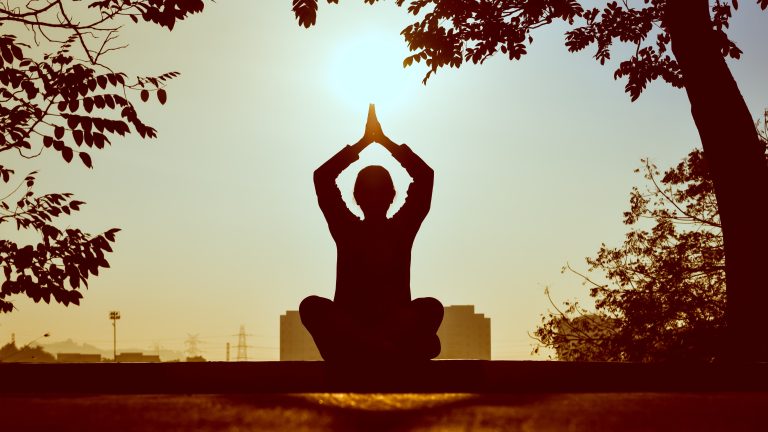Before we proceed, let’s try this together.
Close your eyes. Take a deep breath. Imagine a world where you’re far from the chaos and troubles of life. Peaceful, isn’t it?
That is the power of meditation – a transformative practice that has stood the test of time for thousands of years.
But what exactly is this practice, and why is it so crucial in today’s fast-paced world? If you’re a newbie to meditation – you will love this read. In this meditation guide, we’ll explore the basics of meditation and guide you through simple steps to start your meditation journey (including from the comfort of your bed!). So, get ready, let go of any preconceptions, and let’s embark on a transformative journey of the mind and spirit.
What is Meditation?
In simple terms, meditation is the act of focusing attention and awareness. The practice has been prevalent in cultures the world over and is gaining momentum today among the younger generations too.
However, many people view meditation as the path to becoming a different person, a better person. But that’s not true. Meditation helps you get to know yourself better. It isn’t about stopping or controlling your thoughts and feelings. Instead, you’re simply learning to observe them without judgement. The process of spending time with your mind, becoming more aware, gaining perspective, acting compassionately towards others and being in the present moment is what meditation is all about.
Download the app today!
Why is Meditation important?
Research has linked meditation to both physiological and psychological benefits. With regular practice, here’s how meditation can improve your life:
- Reduces stress and anxiety: Stress management is one of the most common reasons for people to take up meditation. It helps you focus on the present moment, let go of worries and anxious thoughts and cope with stress.
- Boosts mental and emotional health: From improved self-image to a more positive outlook, meditation helps you better know yourself. It enables you to gain a new perspective, look at situations differently and understand your thoughts better, ultimately leading to improved well-being.
- Improves focus and memory: In a world where distractions surround us constantly, who wouldn’t want better focus and attention? Meditation helps improve your attention span and clarity of thought and helps keep your mind young.
- Improves sleep quality: One can never underestimate the power of a good night’s sleep. Studies have found that those who meditate tend to stay asleep longer and experience better quality sleep. By being relaxed and releasing the tension, meditation also places you in a peaceful state, making you sleep with ease.
And that’s not all. Regular practice of meditation can also help you be kinder, fight addictions and manage chronic pain symptoms. It’s something everyone can do at any age to improve their mental, physical and emotional health.
Meditation Guide for Beginners
Now that we know the “why” of meditation, let’s explore the “how”. When beginning to meditate, it’s important to start with the basics:
1. Time and Place
Here’s the truth: meditation can be done anywhere, anytime. Sure, having a quiet, comfortable spot could help. But the best sessions can happen at the most spontaneous of times and places. Just choose whatever works best for you. Wish to start your day on a calming note? Add meditation to your morning routine. Feeling overwhelmed at work? Take a break and indulge in a quick meditation sesh!
2. Don’t overcomplicate it
When starting, start small. You do not need a dedicated half hour or more to meditate. All you need is 5 minutes or less. Over time, you can increase the duration of your sessions to 10 minutes and more.
3. Sit and dress comfortably
As long as you sit upright and keep your back straight and neck and shoulders relaxed, you can meditate anywhere – the couch, office chair or the floor. Tilt your chin downward, rest your hands comfortably in a position you like best and close your eyes to shut out distractions. Be comfortable and relaxed, and wear loose clothing that feels comfy.
4. Choose a focus
While you can focus on an object, mantra or your breath, focusing on the breath is helpful and easy for beginners. Don’t try to control your breath. Just breathe naturally. As you inhale and exhale, pay attention to your body, thoughts and feelings. Observe it all from afar, sans judgement. Stay present in the moment. Notice your mind running or getting distracted? It’s perfectly okay. Gently nudge your attention towards your breath again.
5. Consistency
The ideal meditation routine is either daily or a few times a week. You may find it helpful to schedule a meditation session in your day – like a class or an appointment. Setting a fixed time helps you stay consistent. You could even make it a part of an existing routine – while brushing or cooking. Missed a day? No problem, simply take it up again from where you last left off.
And remember, like any other skill, meditation is one too. When one learns how to swim, it sure is tough in the beginning. But with practice, doesn’t it get easier? Likewise, meditation requires consistency to get comfortable. And don’t worry about getting it “right”. There’s no perfection in meditation. Even the most experienced meditators tend to lose focus. And that’s okay.

Meet your Happiness Goals on Happily
Our Relevant Products
Feel Calm
Feel Motivated
Mindful Relationships
Personal Growth
Brtter Sleep
Slowing Down
and many more...
How to Meditate in Bed for Beginners
If traditional meditation techniques are not for you, we have an alternative – meditate in bed! That’s right, you can still achieve calm and inner peace while lying in your bed. You may lie down on your back or side but ensure your body is relaxed and not tense. The goal is to feel at ease and not strain your body. Pillows can be your best friend here! Use your pillows to support your body and create a comfortable space for yourself. Place a pillow under your head and neck and another between your knees to align your spine.
And don’t worry if you fall asleep. Drifting off to sleep while meditating in bed is all too common. If you fall asleep, gently wake yourself up and meditate. So, there you have it – a simple yet effective way to meditate in bed and indulge in an unwinding routine. Give it a try – you’ll never go back.
Meditation Techniques for Beginners
There are several different forms of meditation – concentrative meditation, mindfulness meditation, body scan meditation, and many more! But you don’t need to ace them all at this point. The following three are our favourites and highly recommended for those new to the practice:
1. Guided Meditation
If you’re a beginner, guided meditation can be a great start. Think of guided meditation as a teacher – one who is there to guide and support you through this new journey. By offering the perfect balance of instructions and quiet moments, guided meditation allows you the space, time and direction to engage in a satisfying meditative session.
2. Meditation Stories
Picture meditation as a fascinating and captivating story that takes you on a journey. Meditation stories are just that (and more!). Crafted to make your meditation practice more interesting and joyful, meditation stories are easy, less intimidating and engaging. As the story progresses, you imagine yourself in a setting painted by the author through your mind’s imagination.
3. Sound Bath Meditation
Another easy meditation technique, especially for music lovers, is sound bath meditation. These could be meditation stories in audio form or immersive sounds and instruments such as gongs, chants and bowls that resonate through you. This meditation style is known to be healing in nature and helpful for beginners, as it helps one to clear their mind, focus on the sound and enter a deep meditative state.
The Bottom Line
Meditation is a delightful gift available to us all – you just need to reach out and grab it! Daily meditation can do wonders for our health and the benefits are many. While getting started may not be as easy, it isn’t impossible. Try the techniques mentioned, follow our tips on how to meditate for beginners, and we promise you will have a lovely first meditative session. Don’t lose hope if you get distracted or find it hard at first – keep practising until it gets easier! Remember, the most important thing is to find what works best for you and make it a habit. Happy meditating!






